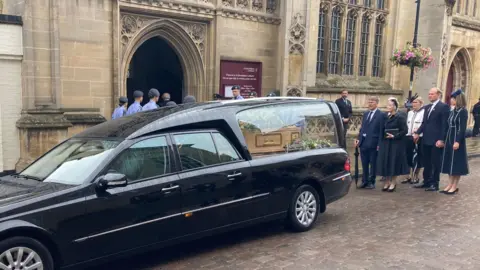The recent funeral of Norman Tebbit, the former Conservative cabinet minister, was an event marked by reflection and remembrance, held at St Edmundsbury Cathedral in Bury St Edmunds, Suffolk—his longtime residence. Lord Tebbit passed away on July 7, 2025, at the age of 94, leaving behind a complicated legacy intertwined with key events in British political history.
The service was attended by many prominent figures from the Conservative Party, showcasing his status and influence within the party. Notable attendees included John Gummer, Sir Iain Duncan Smith, and Sir Jacob Rees-Mogg, all of whom were significant allies during the Thatcher era. Lord Tebbit was revered as a key figure associated with Margaret Thatcher, often seen as one of her most loyal supporters.
In a heartfelt eulogy delivered during the service, Tory peer and author Lord Michael Dobbs described Lord Tebbit as “a giant” in British politics and commended his inspirational leadership. The resonance of Lord Tebbit’s political career was vividly felt as tributes unfolded around his character and contributions, notably reflecting on the significant events that defined his life, including a tragic IRA bombing in 1984 that changed his family forever. The bombing in Brighton left his wife, Margaret, permanently paralyzed and impacted Lord Tebbit both physically and emotionally.
Family members also participated in the ceremony, with Lord Tebbit’s children sharing personal reflections. His daughter, Alison, captured the essence of her father by describing him as “gentle, kind, sometimes ferociously passionate, and uncompromising in pursuit of his ideals.” Meanwhile, son William touched upon their shared love of cricket, highlighting the simple joys that characterized Lord Tebbit’s family life alongside his extensive political career.
In addition to family tributes and music from the choir, the ceremony included a reading from Shakespeare’s *Hamlet*, delivered by Sir Iain Duncan Smith, who followed in Lord Tebbit’s footsteps as the MP for Chingford. Sir Iain remarked on Lord Tebbit’s incredible sense of humor, reflecting on his multifaceted character—a tough competitor with great warmth and kindness, who fostered friendships across political divides.
Lord Dobbs spoke to the ongoing pain Lord Tebbit faced due to the injuries sustained in the Brighton bombing—an event that not only took lives but also marked a turning point in British politics. Amidst the somber reflection of loss, it was made clear that Lord Tebbit’s devotion to his wife, especially after her traumatic injury, exemplified his character and deep love—a commitment that ultimately led him to step away from politics.
As someone who held significant positions during Margaret Thatcher’s government, including the role of party chairman from 1985 to 1987, Lord Tebbit was instrumental in pushing forward policies aimed at curbing union power, which included legal reforms that imposed liabilities on unions for illegal acts. Though his political career encompassed moments of intense controversy and challenge, his legacy as a stalwart of the party and the values it represented remains an enduring part of Conservative history.
The funeral service, which was live-streamed and included hymns, reflected not only on Lord Tebbit’s personal journey but also on the broader socio-political landscape that defined his life. As reflections from both family and political peers filled the cathedral, it became evident that while Lord Tebbit’s life came to a close, the discussions surrounding his influence and legacy would continue to shape conversations within British politics for years to come. The service lasted about an hour and a half, leaving attendees with poignant memories and insights into a complex man who played a vital role in his country’s history.











